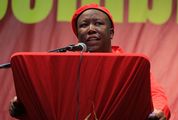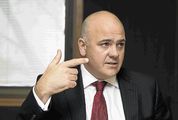THE SACP on Friday condemned the disruptions during President Jacob Zuma’s state of the nation address in Parliament and said it supported the presiding officer’s actions to stop it.
"The (South African Communist Party) calls for new preventive and responsive measures to bring to an end the abuse and misuse of Parliament, to disrupt its mandate and hold back the advance of the democratic, social and economic transformation of our country," spokesman Alex Mashilo said in a statement.
"The counterproductive behaviour of disrupting the work of our democratically elected Parliament and government accountability can only be the work of those who are not interested to see South Africa move forward."
Three Economic Freedom Fighters (EFF) MPs, including party leader Julius Malema, were told to leave the House after they persisted in trying to question Mr Zuma about misspending on his home in Nkandla, KwaZulu-Natal, after he started delivering his state of the nation address on Thursday.
Security officers were called in to escort the MPs out of the National Assembly.
The Democratic Alliance (DA) walked out shortly afterwards in protest against the security officers’ presence in the National Assembly Chamber.
Mr Zuma then resumed his speech.
The SACP welcomed Mr Zuma’s tabling of the address despite the "right-wing alliance of the forces of counter-revolution" leaving the House.
The Council for the Advancement of the South African Constitution (Casac) said Thursday was a sad day for the country’s democracy.
"Political leaders in Parliament need to urgently reflect on the implications, both political and constitutional, of what occurred during the joint sitting of Parliament," it said in a statement.
"They need to account for what transpired and provide solutions so that ordinary people can be assured that our democratic foundations are not being permanently eroded."
Casac believed a number of constitutional transgressions needed attention, including the jamming of the cellphone signal before proceedings began, and the EFF’s disruption of proceedings.
Casac said the EFF had abused parliamentary rules to the point where the constitutional rights of other MPs and Mr Zuma were infringed on.
"While it is certainly important to recognise that the rights to free speech, and the privileges of all MPs must be carefully protected ... so it follows that this principle applies across the House to all MPs.
"To deny the president this opportunity (to account to Parliament on his government’s programme) is to undermine the accountability function of Parliament," it said.
However, Casac also recognised that Mr Zuma had not yet provided adequate answers to questions about Nkandla.
"This, too, represents a failure in constitutional accountability that must be urgently rectified by the president."
Casac also wanted the identity of the security officers who removed the EFF MPs to be made public.
The DA demanded that Speaker Baleka Mbete be held to account for the incident, saying that security forces had no right to forcibly remove all EFF MPs from Parliament.
DA chief whip John Steenhuisen made the point at a media briefing on Friday that the majority of EFF MPs were not ordered out of the National Assembly by Ms Mbete, yet were "kicked, beaten, pummelled and carted away like cattle".
Referring to Reneilwe Mashabela, he said: "Yesterday (Thursday), one of the ladies from the EFF was kicked against a table in the most brutal manner."
Mr Steenhuisen claimed Ms Mbete had called in armed police who were "trained to deal with thugs", instead of asking parliamentary protection officers to remove the EFF MPs she ordered to leave the Chamber.
He said this violated the constitutional separation of powers, as the police reported to the executive, and that she should be called before Parliament’s powers and privileges committee.
"It is a slippery slope away from constitutional democracy."
DA parliamentary leader Mmusi Maimane said the DA was taking legal advice and would seek a court order explicitly barring presiding officers from calling the police into the National Assembly because legislation may not be clear enough in this regard.
He went on to accuse Ms Mbete of being partisan and acting in bad faith.
"In this instance, the Speaker of the National Assembly is a member of the (African National Congress).
"The speaker of the National Assembly acted in the interests of the ANC. She allowed the executive to act in a manner that they sought to find ways to undermine the constitution.
"She protected President Jacob Zuma."
Mr Maimane stressed the walkout by the DA before Mr Zuma resumed his speech was in protest at police being called, and not in support of the EFF’s actions.
"I think the actions of the EFF were wrong. If the ruling concludes that your point of order is not appropriate, in my view you should accept that ruling and you need to, if you are asked to leave the Chamber, you need to be able to do that yourself."
Agri SA said the chaos which erupted in Parliament was indicative of the mounting frustration experienced by a number of South Africans.
"It was ... an opportunity missed to inspire South Africans and investors about our country’s prospects."
It said Mr Zuma’s reference to agriculture and land in his address was a further example of utterances which undermined confidence and had a detrimental effect on the economy.
"Agri SA will seek urgent clarification from government regarding the interpretation of the relevant proposals, also how they envisage the implementation thereof, bearing in mind limited funding and capacity.
"Although Agri SA will also consider steps to test the legality of the proposals, which at face value could be unconstitutional, the organisation will continue to hold discussions with the government in this regard," it said.
Mr Zuma announced new proposals on land such as a ceiling on land ownership and an end to foreign ownership.
Sapa

President Jacob Zuma reacts to the events in the National Assembly during the state of the nation address in Cape Town on February 12. Picture: THE TIMES/ESA ALEXANDER
THE SACP on Friday condemned the disruptions during President Jacob Zuma’s state of the nation address in Parliament and said it supported the presiding officer’s actions to stop it.
"The (South African Communist Party) calls for new preventive and responsive measures to bring to an end the abuse and misuse of Parliament, to disrupt its mandate and hold back the advance of the democratic, social and economic transformation of our country," spokesman Alex Mashilo said in a statement.
"The counterproductive behaviour of disrupting the work of our democratically elected Parliament and government accountability can only be the work of those who are not interested to see South Africa move forward."
Three Economic Freedom Fighters (EFF) MPs, including party leader Julius Malema, were told to leave the House after they persisted in trying to question Mr Zuma about misspending on his home in Nkandla, KwaZulu-Natal, after he started delivering his state of the nation address on Thursday.
Security officers were called in to escort the MPs out of the National Assembly.
The Democratic Alliance (DA) walked out shortly afterwards in protest against the security officers’ presence in the National Assembly Chamber.
Mr Zuma then resumed his speech.
The SACP welcomed Mr Zuma’s tabling of the address despite the "right-wing alliance of the forces of counter-revolution" leaving the House.
The Council for the Advancement of the South African Constitution (Casac) said Thursday was a sad day for the country’s democracy.
"Political leaders in Parliament need to urgently reflect on the implications, both political and constitutional, of what occurred during the joint sitting of Parliament," it said in a statement.
"They need to account for what transpired and provide solutions so that ordinary people can be assured that our democratic foundations are not being permanently eroded."
Casac believed a number of constitutional transgressions needed attention, including the jamming of the cellphone signal before proceedings began, and the EFF’s disruption of proceedings.
Casac said the EFF had abused parliamentary rules to the point where the constitutional rights of other MPs and Mr Zuma were infringed on.
"While it is certainly important to recognise that the rights to free speech, and the privileges of all MPs must be carefully protected ... so it follows that this principle applies across the House to all MPs.
"To deny the president this opportunity (to account to Parliament on his government’s programme) is to undermine the accountability function of Parliament," it said.
However, Casac also recognised that Mr Zuma had not yet provided adequate answers to questions about Nkandla.
"This, too, represents a failure in constitutional accountability that must be urgently rectified by the president."
Casac also wanted the identity of the security officers who removed the EFF MPs to be made public.
The DA demanded that Speaker Baleka Mbete be held to account for the incident, saying that security forces had no right to forcibly remove all EFF MPs from Parliament.
DA chief whip John Steenhuisen made the point at a media briefing on Friday that the majority of EFF MPs were not ordered out of the National Assembly by Ms Mbete, yet were "kicked, beaten, pummelled and carted away like cattle".
Referring to Reneilwe Mashabela, he said: "Yesterday (Thursday), one of the ladies from the EFF was kicked against a table in the most brutal manner."
Mr Steenhuisen claimed Ms Mbete had called in armed police who were "trained to deal with thugs", instead of asking parliamentary protection officers to remove the EFF MPs she ordered to leave the Chamber.
He said this violated the constitutional separation of powers, as the police reported to the executive, and that she should be called before Parliament’s powers and privileges committee.
"It is a slippery slope away from constitutional democracy."
DA parliamentary leader Mmusi Maimane said the DA was taking legal advice and would seek a court order explicitly barring presiding officers from calling the police into the National Assembly because legislation may not be clear enough in this regard.
He went on to accuse Ms Mbete of being partisan and acting in bad faith.
"In this instance, the Speaker of the National Assembly is a member of the (African National Congress).
"The speaker of the National Assembly acted in the interests of the ANC. She allowed the executive to act in a manner that they sought to find ways to undermine the constitution.
"She protected President Jacob Zuma."
Mr Maimane stressed the walkout by the DA before Mr Zuma resumed his speech was in protest at police being called, and not in support of the EFF’s actions.
"I think the actions of the EFF were wrong. If the ruling concludes that your point of order is not appropriate, in my view you should accept that ruling and you need to, if you are asked to leave the Chamber, you need to be able to do that yourself."
Agri SA said the chaos which erupted in Parliament was indicative of the mounting frustration experienced by a number of South Africans.
"It was ... an opportunity missed to inspire South Africans and investors about our country’s prospects."
It said Mr Zuma’s reference to agriculture and land in his address was a further example of utterances which undermined confidence and had a detrimental effect on the economy.
"Agri SA will seek urgent clarification from government regarding the interpretation of the relevant proposals, also how they envisage the implementation thereof, bearing in mind limited funding and capacity.
"Although Agri SA will also consider steps to test the legality of the proposals, which at face value could be unconstitutional, the organisation will continue to hold discussions with the government in this regard," it said.
Mr Zuma announced new proposals on land such as a ceiling on land ownership and an end to foreign ownership.
Sapa






























Post a comment